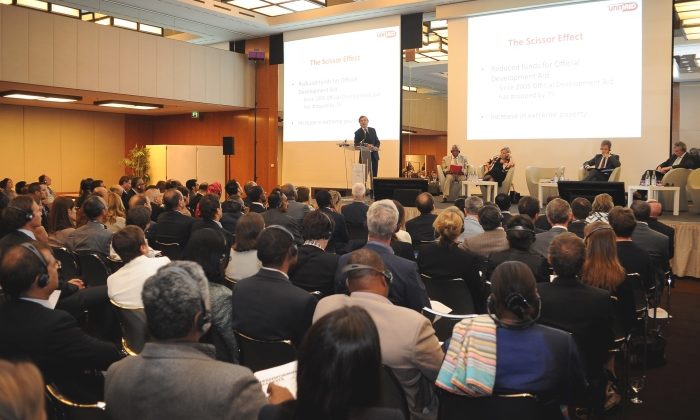UNITAID, DNDi, and the Medicines Patent Pool Gather Global Experts, Health Ministries, and Industry Leaders in Support of the Initiative to Expedite Development and Delivery of New Antiretroviral Formulations.
On the eve of the 67th World Health Assembly, Ministers of Health from over fifteen countries including Brazil, Chile, Mauritius, and South Africa; industry and global public health leaders; as well as senior representatives from the HIV/AIDS community joined UNITAID Chair Philippe Douste-Blazy at a special event last evening to urge a more coordinated response to caring for the 3.3 million children currently living with HIV. While significant progress has been made over the past 15 years in improving access to antiretroviral treatment for adults, only a quarter of children in need receive ARV therapy today. Each day, 500 children die of HIV/AIDS-related causes.
To scale-up treatment for children, UNITAID, the Drugs for Neglected Diseases initiative (DNDi), and the Medicines Patent Pool (MPP), announced a Paediatric HIV Treatment Initiative (PHTI) [PDF, 850 KB]. The PHTI will focus on overcoming the barriers to developing and delivering specific paediatric formulations and combinations appropriate for children. There have been significant strides in reducing new paediatric HIV infections in recent years. However, there is still an unacceptably large number of children in need of treatment” said Dr. Philippe Douste-Blazy at last night’s event. “The majority of kids still don’t receive any treatment at all, and those who do, have no choice but to take regimens formulated for adults, often unpalatable and difficult to administer. Efforts must be stepped up to ensure that these children have access to much better treatment as soon as these treatments are available for adults. Only by building a partnership of all actors in the HIV paediatric area to bring the range of expertise needed, can we hope to address this public health priority.”
Developing appropriate medicines for children living with HIV has always been challenging. Few options are available today, and efficacious antiretrovials (ARVs) in child-friendly formulations in fixed-dose combinations, requiring no refrigeration, are sorely lacking. DNDi will coordinate the R&D component of the PHTI by working with pharmaceutical companies, academic institutions, World Health Organization expert groups, and other stakeholders to track progress and ensure timely development of adapted ARV formulations. UNITAID is funding a DNDi project to develop specific ARV fixed-dose combinations for infants and very young children. “Research and development of appropriate ARV formulations for children with HIV is still lagging behind. We need even more innovation and stronger collaboration to bring the missing formulations to the children who need them,” said Dr. Bernard Pécoul, Executive Director of DNDi. “The reality of mothers, caregivers, and children who struggle every day to take current treatments has to change, and overcoming the obstacles to developing better formulations is a key part of the PHTI.”
“Of the 3.3 million children with HIV in the world, there is a great burden in South Africa. Current treatment options are insufficient and there is little to no incentive for drug development,” stated South African Minister of Health, Aaron Mostoaledi, in a keynote address. “The most commonly used regimens used today for children with HIV have toxicity and formulation concerns. New adapted treatments are an emergency, and a dream that must be made reality. ”
Building on its current partnerships with industry to broker public health-focused licensing agreements for priority ARVs, MPP, funded by UNITAID, will lead the PHTI’s efforts to pool relevant intellectual property. In his remarks last evening, MPP’s Executive Director Greg Perry announced that Merck / MSD has formally started negotiations to license paediatric formulations of the ARV, raltegravir, to the MPP. This company joins AbbVie in active negotiations with MPP to increase access to HIV paediatric medicines as well as private sector partners – ViiV Healthcare, Gilead Sciences, and Bristol-Myers Squibb – that have licensed to the MPP. “The PHTI is an important extension of our mission and we’re pleased to have increased private sector support,” said Perry. “The IP of several patent holders will be required to create effective paediatric fixed-dose combinations and patent sharing will be essential in speeding the development and production of low-cost, appropriate generic drugs for developing world settings.”
Moving forward, the PHTI will invite other public health organizations active in the field of paediatric HIV to join efforts in addressing policy-related challenges. Potential funders of product development and procurement, regulators, industry representatives, generic medicine manufactures, and communities of people living with HIV will be encouraged to work within the PHTI on a wide range of issues, from stimulating market uptake of new formulations to country preparedness initiatives. Together, the partners will coordinate closely with World Health Organization technical experts who have identified key missing formulations and dosing schedules necessary to fulfill the WHO treatment guidelines for children, and ultimately close the treatment gap that currently exists between children and adults living with HIV.
View All News
